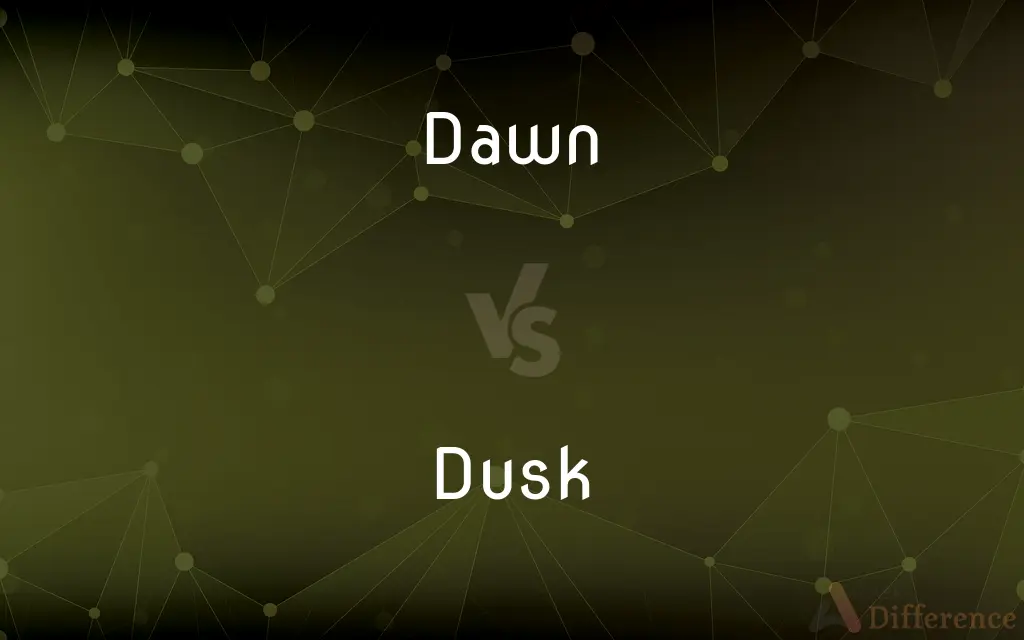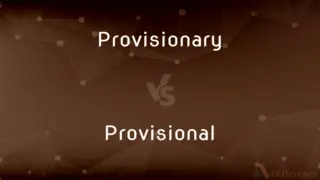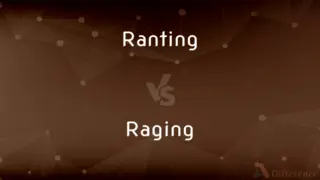Dawn vs. Dusk — What's the Difference?
Edited by Tayyaba Rehman — By Fiza Rafique — Updated on September 21, 2023
Dawn is the period of twilight that occurs before sunrise, marking the beginning of the day. Dusk is the period of diminishing light after sunset, indicating the day's end. Both are transitional phases but dawn leads to daylight and dusk to darkness.

Difference Between Dawn and Dusk
Table of Contents
ADVERTISEMENT
Key Differences
Dawn is that enchanting time when night begins to fade and the sun starts to rise, illuminating the sky. Often divided into three phases: astronomical dawn, nautical dawn, and civil dawn, it marks the commencement of a new day. The sky gradually changes color, from deep indigo to lighter shades of blue and pink.
Dusk, on the other hand, is the period that marks the close of the day and is a prelude to nighttime. Similar to dawn, it's usually divided into civil dusk, nautical dusk, and astronomical dusk. During dusk, the sky starts with vibrant hues of orange and red before darkening into shades of purple and black.
The key difference between dawn and dusk lies in the transition they represent. Dawn is a transition from darkness to light, while dusk is a transition from light to darkness. Each has its distinct beauty, with dawn often symbolizing new beginnings and hope, while dusk tends to evoke feelings of calmness and reflection.
In meteorological terms, dawn and dusk are crucial for understanding light conditions for various activities, including aviation and shipping. While dawn offers the first light necessary for daytime activities, dusk marks the end of sufficient natural light and signifies that artificial lighting will be needed.
Comparison Chart
Time of Day
Morning
Evening
ADVERTISEMENT
Transition
Darkness to Light
Light to Darkness
Phases
Astronomical, Nautical, Civil
Civil, Nautical, Astronomical
Symbolism
New beginnings, hope
Ending, calmness
Meteorological Use
Initiates daylight activities
Ends natural light for activities
Compare with Definitions
Dawn
A symbol of hope or new beginnings.
Dawn broke, bringing new hope to the stranded travelers.
Dusk
The period after sunset before full darkness.
The fireflies started to appear at dusk.
Dawn
The beginning of something.
The dawn of the internet changed society forever.
Dusk
A period important for evening activities.
The streetlights automatically turn on at dusk.
Dawn
A period important for astronomical observations.
Astronomers gather data during astronomical dawn.
Dusk
Dusk occurs at the darkest stage of twilight, or at the very end of astronomical twilight after sunset and just before night. At predusk, during early to intermediate stages of twilight, enough light in the sky under clear conditions may occur to read outdoors without artificial illumination; however, at the end of civil twilight (when Earth rotates to a point at which the center of the Sun's disk is 6° below the local horizon), such lighting is required to read outside.
Dawn
Dawn is the time that marks the beginning of twilight before sunrise. It is recognized by the appearance of indirect sunlight being scattered in Earth's atmosphere, when the centre of the Sun's disc has reached 18° below the observer's horizon.
Dusk
The darker stage of twilight, especially in the evening.
Dawn
The time each morning at which daylight first begins.
Dusk
Tending to darkness; dusky.
Dawn
A first appearance; a beginning
The dawn of history.
Dusk
To become or make dark or dusky.
Dawn
To begin to become light in the morning.
Dusk
A period of time at the end of day when the sun is below the horizon but before the full onset of night, especially the darker part of twilight.
Dawn
To begin to appear or develop; emerge.
Dusk
A darkish colour.
Dawn
To begin to be perceived or understood
Realization of the danger soon dawned on us.
Dusk
The condition of being dusky; duskiness
Dawn
(intransitive) To begin to brighten with daylight.
A new day dawns.
Dusk
(intransitive) To begin to lose light or whiteness; to grow dusk.
Dawn
(intransitive) To start to appear or be realized.
I don’t want to be there when the truth dawns on him.
Dusk
(transitive) To make dusk.
Dawn
(intransitive) To begin to give promise; to begin to appear or to expand.
Dusk
Tending to darkness or blackness; moderately dark or black; dusky.
Dawn
(uncountable) The morning twilight period immediately before sunrise.
Dusk
Tending to darkness or blackness; moderately dark or black; dusky.
A pathless desert, dusk with horrid shades.
Dawn
(countable) The rising of the sun.
Dusk
Imperfect obscurity; a middle degree between light and darkness; twilight; as, the dusk of the evening.
Dawn
(uncountable) The time when the sun rises.
She rose before dawn to meet the train.
Dusk
A darkish color.
Whose duck set off the whiteness of the skin.
Dawn
(uncountable) The earliest phase of something.
The dawn of civilization
Dusk
To make dusk.
After the sun is up, that shadow which dusketh the light of the moon must needs be under the earth.
Dawn
To begin to grow light in the morning; to grow light; to break, or begin to appear; as, the day dawns; the morning dawns.
In the end of the Sabbath, as it began to dawn toward the first day of the week, came Mary Magdalene . . . to see the sepulcher.
Dusk
To grow dusk.
Dawn
To began to give promise; to begin to appear or to expand.
When life awakes, and dawns at every line.
Dawn on our darkness and lend us thine aid.
Dusk
The time of day immediately following sunset;
He loved the twilight
They finished before the fall of night
Dawn
The break of day; the first appearance of light in the morning; show of approaching sunrise.
And oft at dawn, deep noon, or falling eve.
No sun, no moon, no morn, no noon,No dawn, no dusk, no proper time of day.
Dusk
A phase when natural light diminishes.
Nautical dusk is when the horizon is no longer visible at sea.
Dawn
First opening or expansion; first appearance; beginning; rise.
These tender circumstances diffuse a dawn of serenity over the soul.
Dusk
A symbol of the end or quietude.
The day came to a close, marked by the quiet of dusk.
Dawn
The first light of day;
We got up before dawn
They talked until morning
Dusk
A time for specific religious observations.
Certain prayers are performed at dusk in some faiths.
Dawn
The earliest period;
The dawn of civilization
The morning of the world
Dawn
An opening time period;
It was the dawn of the Roman Empire
Dawn
Become clear or enter one's consciousness or emotions;
It dawned on him that she had betrayed him
She was penetrated with sorrow
Dawn
Appear or develop;
The age of computers had dawned
Dawn
Become light;
It started to dawn, and we had to get up
Dawn
The first light before sunrise.
We started our hike at the break of dawn.
Dawn
A phase preceding full daylight.
Civil dawn is when the sun is just below the horizon.
Common Curiosities
What is dusk?
Dusk is the period after sunset before it becomes fully dark.
What does dawn symbolize?
Dawn often symbolizes new beginnings and hope.
What is dawn?
Dawn is the period before sunrise when the sky starts to lighten.
When does dawn occur?
Dawn occurs in the morning before the sun rises.
How many phases of dusk are there?
There are three: civil, nautical, and astronomical.
When does dusk occur?
Dusk occurs in the evening after the sun sets.
What does dusk symbolize?
Dusk often symbolizes endings or calmness.
How many phases of dawn are there?
There are three: astronomical, nautical, and civil.
Is dusk important in religion?
Yes, some religions have practices or prayers specific to the time of dusk.
Is dusk a symbol in literature?
Yes, dusk is often used to symbolize endings or a reflective mood.
Is dawn important in religion?
Yes, in some religions dawn marks the time for specific prayers or rituals.
How is dawn used in navigation?
Dawn provides the first safe light for sailors and pilots.
How is dusk used in navigation?
Dusk indicates that natural light is diminishing, affecting navigation.
Is dawn a symbol in literature?
Yes, dawn is often used to symbolize hope or a new chapter in literature.
Can dawn and dusk affect wildlife behavior?
Yes, many animals are active during dawn and dusk, known as "crepuscular" behavior.
Share Your Discovery

Previous Comparison
Provisionary vs. Provisional
Next Comparison
Ranting vs. RagingAuthor Spotlight
Written by
Fiza RafiqueFiza Rafique is a skilled content writer at AskDifference.com, where she meticulously refines and enhances written pieces. Drawing from her vast editorial expertise, Fiza ensures clarity, accuracy, and precision in every article. Passionate about language, she continually seeks to elevate the quality of content for readers worldwide.
Edited by
Tayyaba RehmanTayyaba Rehman is a distinguished writer, currently serving as a primary contributor to askdifference.com. As a researcher in semantics and etymology, Tayyaba's passion for the complexity of languages and their distinctions has found a perfect home on the platform. Tayyaba delves into the intricacies of language, distinguishing between commonly confused words and phrases, thereby providing clarity for readers worldwide.















































